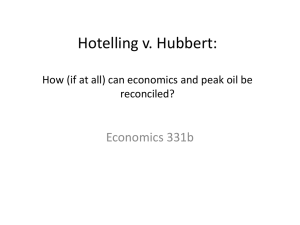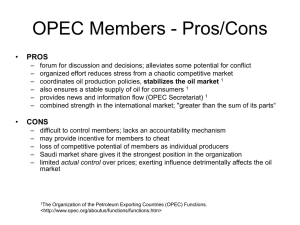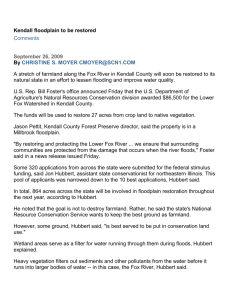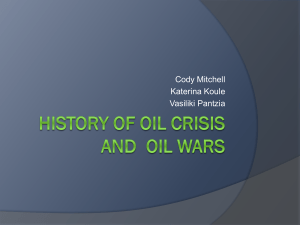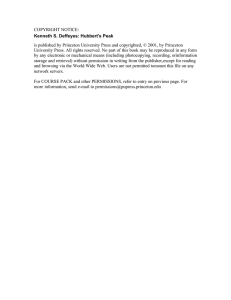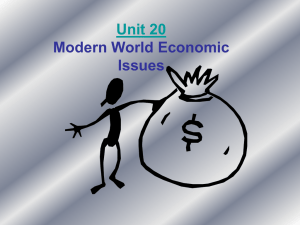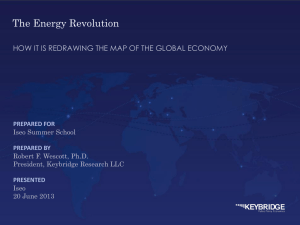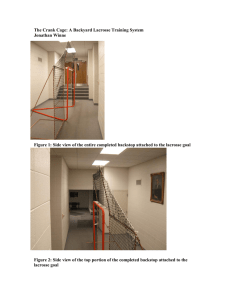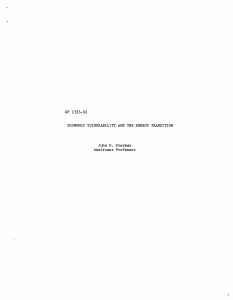Hotelling theory - Department of Economics
advertisement
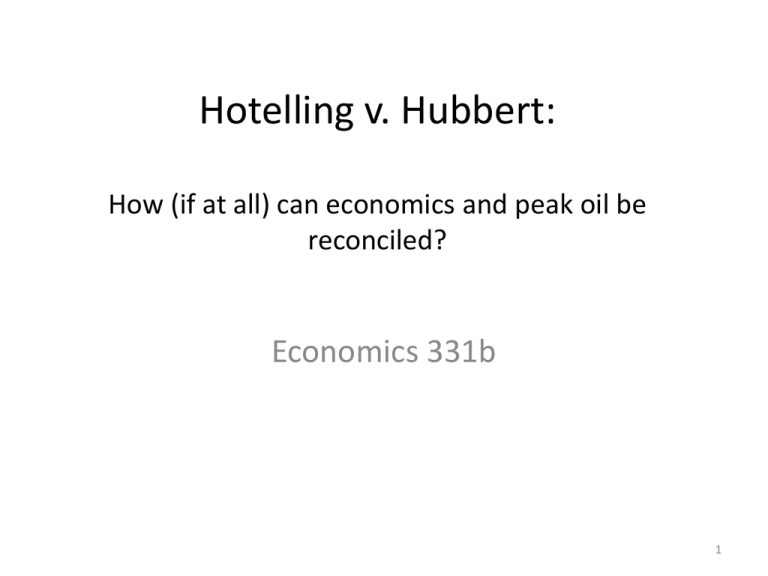
Hotelling v. Hubbert: How (if at all) can economics and peak oil be reconciled? Economics 331b 1 Hubbert concerns the Q Hotelling concerns the P Can they be married into a happy P-Q couple? 2 Hubbert theory The Hubbert peak-oil theory posits that for any given geographical area, from an individual oil-producing region to the planet as a whole, the rate of petroleum production tends to follow a bell-shaped (normal) curve. There is no explicit economics in this approach. 3 Hubbert curve for US 3,600 US crude oil production Hubbert curve Production (barrels/year) 3,200 2,800 2,400 2,000 1,600 1,200 800 (peak 1976; total = 222; cum to date = 197) 400 0 00 10 20 30 40 50 60 70 80 90 00 10 Data source: Oil production for EIA. Hubbert curve fit by Nordhaus. 4 Hotelling theory • Let rt = net price of oil in ground = pt – et = price of oilt – extraction costt • Oil is developed and produced to meet the arbitrage condition for assets: rt* = market rate of return on assets = ri,j,t = return on oil in the ground for grade i, location j, time t. • Note that arbitrage condition holds only when production is positive (price-quantity duality condition) 5 Real crude oil prices (2010 $ per barrel) 200 100 80 60 50 40 30 20 10 50 55 60 65 70 75 80 85 90 95 00 05 10 Data source: Oil price data from EIA and BLS. Price deflation by CPI from BLS. 6 200 Real oil price 100 80 60 50 40 30 20 10 Hotelling growth at r = 3% per year 1975 1980 1985 1990 Hotelling line 1995 2000 2005 2010 Real oil price 7 Arranged marriage of Hotelling and Hubbert Let’s construct a little Hotelling-style oil model and see whether the properties look Hubbertian. Technological assumptions: – Four regions: US, other non-OPEC, OPEC Middle East, and other OPEC – Ultimate oil resources (OIP) in place shown on next page. – Recoverable resources are OIP x RF – Cumulative extraction – Constant marginal production costs for each region – Fields have exponential decline rate of 10 % per year Economic assumptions – Oil is produced under perfect competition costs are minimized to meet demand – Oil demand is perfectly price-inelastic – There is a backstop technology at $100 per barrel 8 How to calculate equilibrium 1. We can do it by bruit force by constructing many supply and demand curves. Not fun. 2. Modern approach is to use the “correspondence principle.” This holds that any competitive equilibrium can be found as a maximization of a particular system. 9 Economic Theory Behind Modeling 1. Basic theorem of “markets as maximization” (Samuelson, Negishi) Maximization of weighted utility function: Outcome of efficient competitive market (however complex but finite time) n = W i [U i (c ki ,s ,t )] i 1 for utility functions U; individuals i=1,...,n; locations k, uncertain states of world s, i time periods t; welfare weights ; and subject to resource and other constraints. 2. This allows us (in principle) to calculate the outcome of a market system by a constrained non-linear maximization. 10 Specific Tools for Finding Solution 1. Some kind of Newton’s method. - Start with system z = g(x). Use trial values until converges (if you are lucky and live long enough). 2. EXCEL “Solver,” which is convenient but has relatively low power. - I will use this for the Hotelling model. 3. GAMS software. Has own language, proprietary software, but very powerful - This is used in many economic integrated assessment models of climate change. 11 Estimates of Petroleum in Place Department of Energy, Energy Information Agency, Report #:DOE/EIA-0484(2008) 12 Petroleum supply data Source Initial volume (billion barrels) Recovery factor Recoverable (billion barrels) Cumulative producion (billion barrels) Remaining volume Marginal extraction cost ($ per barrel) Decline rate (per year) US 1,100 60% 660 206 454 80 10% Other nonOPEC 3,300 50% 1,650 434 1,216 50 10% Other OPEC 2,900 50% 1,450 207 1,243 20 10% OPEC Middle East 2,900 50% 1,450 324 1,126 10 10% Sources: Resource data and extraction from EIA and BP; costs from WN 13 Demand assumptions Historical data from 1970 to 2008 Then assumes that demand function for oil grows at 2 percent for year (3 percent output growth, income elasticity of 0.67). Price elasticity of demand = 0 Backstop price = $100 per barrel of oil equivalent. Conventional oil and backstop are perfect substitutes. 14 Solution technique min 2200 t 2010 [c i , j ,t x i , j ,t c B Bt ](1 r )t subject to 2200 t 2010 x i , j ,t Ri , j , resource constraints, all regions and grades xi , j ,t Bt Dt , must meet demand for all time periods i, j x i , j ,t = oil production of grade i and j and time t c i , j ,t = cost per barrel oil production Ri , j = recoverable oil of grade i and j Bt = production of backstop technology Dt = demand for oil 15 Picture of spreadsheet 16 Results: Price trajectory 120 100 80 Price of oil Supply price US 60 Supply price non OPEC Supply price non-ME OPEC 40 Supply price OPEC Middle East 20 0 2005 2015 2025 2035 2045 2055 2065 2075 2085 17 Results: Price trajectory and actual 120 Price of oil (2008 prices) 100 80 60 Efficiency price of oil Supply price US 40 Supply price non OPEC Supply price non-ME OPEC 20 Supply price OPEC Middle East History 0 1970 1980 1990 2000 2010 2020 2030 2040 2050 2060 2070 2080 2090 2100 2110 18 Results: Output trajectory Oil Production (billion barrels per 5 years) 500 450 Conventional oil 400 Oil and backstop 350 History 300 250 200 150 100 50 0 1970 1980 1990 2000 2010 2020 2030 2040 2050 2060 2070 2080 2090 2100 How differs from Hubbert theory: 1. Much later peak 2. Not a bell curve; slower rise and steeper decline 19 Rate of increase in real oil prices 20.0% 15.0% History 10.0% Efficiency 5.0% 2090 2085 2080 2075 2070 2065 2060 2055 2050 2045 2040 2035 2030 2025 2020 2015 2010 2005 2000 1995 1990 1985 1980 0.0% -5.0% -10.0% -15.0% 20 Further questions Why are actual prices above model calculations? Why is there so much short-run volatility of oil prices? Since backstop does not now exist, will market forces induce efficient R&D on backstop technology? 21
